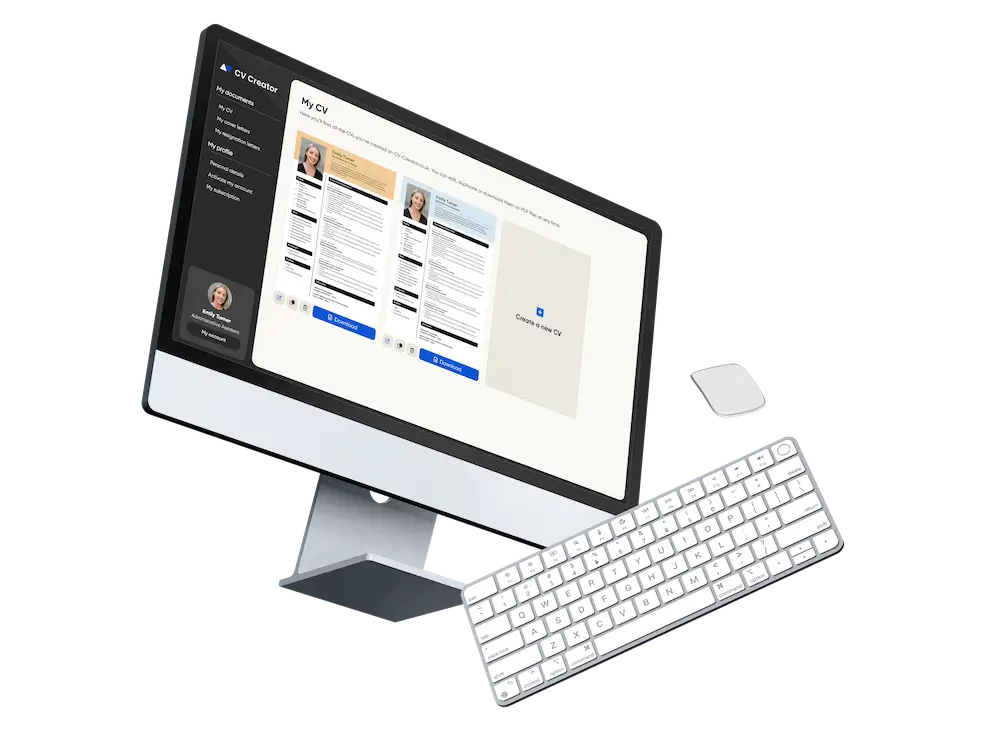CV Creator » CV advice »
Language skills on a CV
Language skills can boost your CV fast — if you present them clearly and at the right level.

Where to put language skills on your CV
In most cases, languages deserve their own section (not inside hobbies). Use placement that matches how important the language is for the role.
Best option (most candidates): a dedicated “Languages” section
- Place it after Work experience (or after Skills if you’re junior).
- Keep it short: language + level (+ proof if relevant).
- Order from strongest to weakest (or job-relevant first).
If the language is a core requirement: mention it twice
- In your personal statement (one line that signals value).
- In the Languages section (with CEFR level + evidence).
Example line for your personal statement:
Bilingual English/French (C2/C2), customer-facing experience in both languages.
If you use a two-column CV layout
- Languages work well in the sidebar (easy to scan).
- Use simple text (ATS-friendly): avoid icons-only or image-based bars.
If you want step-by-step guidance on how to structure every CV section (profile, work experience, education, skills, and more), see our guide: How to write each section of your professional CV.
How to show your language level (CEFR)
To avoid vague labels (“good”, “fluent”), use a recognised scale. The most widely understood option in the UK and Europe is CEFR, which runs from A1 (beginner) to C2 (proficient).
Quick CEFR guide (keep it simple)
CEFR levels help recruiters understand your language ability at a glance — without guessing what “good” or “fluent” means. If you’re unsure, pick the closest level based on what you can do in real work situations (calls, meetings, emails, reports), not how long you studied the language.
- A1–A2 — Beginner (basic phrases, simple conversations)
- B1–B2 — Intermediate / Independent (can work in the language in many situations)
- C1–C2 — Advanced / Proficient (professional fluency, complex topics)
Native vs bilingual vs fluent (use carefully)
These labels can mean different things to different employers, so use them only if they’re accurate and pair them with a CEFR level when possible. To avoid misunderstandings, write it like this: “English — C1 (Fluent)” or “French — Native”, and keep the wording consistent across all languages.
- Native / Mother tongue: a language you grew up using daily.
- Bilingual: you can live and work confidently in both languages (add CEFR for clarity).
- Fluent: can mean different things to different recruiters — pair it with CEFR.
Language skills examples (copy-and-paste formats)
Pick one format and stick to it for every language. Don’t mix scales (e.g., stars for one language and CEFR for another).
Clean CEFR list (most common)
- English — C1 (Advanced)
- Spanish — B2 (Upper-intermediate)
- German — A2 (Elementary)
Language + level + proof (best when it’s job-critical)
- English — C1 | Daily client calls and email support
- Italian — B2 | 6 months working in Milan (customer service)
Spoken vs written (useful for admin, support, international roles)
- English — Speaking C1 | Writing C1
- Spanish — Speaking B2 | Writing B1
Bilingual / native emphasis (when it’s a selling point)
- French — Native
- English — C2 (Bilingual proficiency)
Ultra-short (if space is tight)
Languages: English (C1), Spanish (B2), German (A2)
How to prove your level (when it matters)
If the job truly depends on the language, add a quick proof line. If it’s “nice to have”, CEFR alone is often enough.
Good proof signals (choose 1 per language)
- Certification score (e.g., IELTS for English, DELE for Spanish)
- Work evidence (client calls, negotiations, reporting, customer support)
- Education in that language (degree taught fully in English, exchange programme)
- Practical output (presentations delivered, translated content, documentation written)
Self-assessment (acceptable if you’re honest)
If you don’t have an official certificate, self-assess using a recognised grid and pick the closest CEFR level. Keep your claim realistic — recruiters may test it in interview.
If you’re a beginner (should you include it?)
A beginner language can be a plus on your CV — but only when it supports the role. If it’s unrelated (or you’re listing several A1/A2 languages), it usually looks like filler rather than a real skill.
To keep it credible, mention a realistic CEFR level and one proof signal that shows you’re actively learning:
- German — A2 (currently studying, weekly lessons)
- Italian — A1 (basic conversation; course in progress)
- Spanish — A2 (self-study + weekly speaking practice)
Avoid: listing “A1” for 4–5 languages. It looks like padding and doesn’t help a recruiter decide.
If you’re a student or recent graduate, you’ll find more beginner-friendly examples (and what to prioritise when you lack experience) in our guide: Graduate CV.
Common mistakes (and how to fix them)
Using vague labels like “fluent” or “good”. Use a clear level (ideally CEFR) so recruiters can understand your ability instantly (e.g., English — C1).
Hiding languages inside hobbies or interests. Create a dedicated Languages section so it’s easy to scan and doesn’t look like padding.
Overstating your level. Choose the closest level based on what you can do in real work situations, and add one proof line if the role depends on it.
Using icons-only bars or star ratings. ATS tools read plain text more reliably, so always write your level in text (A2, B1, B2, C1, C2, Native).
Listing every language you ever studied. Keep only languages that support the job, or show active learning for beginner levels (e.g., “A2 — currently studying”).
Final checklist: language skills done right
Before you send your CV, use this quick checklist to make sure your language section is clear, credible, and easy for recruiters (and ATS) to scan.
- I used one level system (ideally CEFR) for every language.
- I placed languages where they’re easy to find (dedicated section or sidebar).
- I ordered languages by strength or job relevance.
- I added proof only where the role depends on the language.
- I avoided vague labels and unrealistic claims.
- My formatting is ATS-friendly (plain text, consistent layout).
FAQ: language skills on a CV
Should I use CEFR levels on a UK CV?
What CEFR level counts as “fluent”?
How many languages should I list on my CV?
Should I include IELTS (or another certificate) on my CV?
Can I use stars, bars, or icons to show my language level?
Where do I put “bilingual” on my CV?
Should I split spoken and written level?

Build a CV recruiters can scan in seconds
Want a clean CV layout with a ready-made “Languages” section (ATS-friendly and easy to edit)? Create your CV in minutes with CV Creator and download it as a polished PDF.
Create your CV